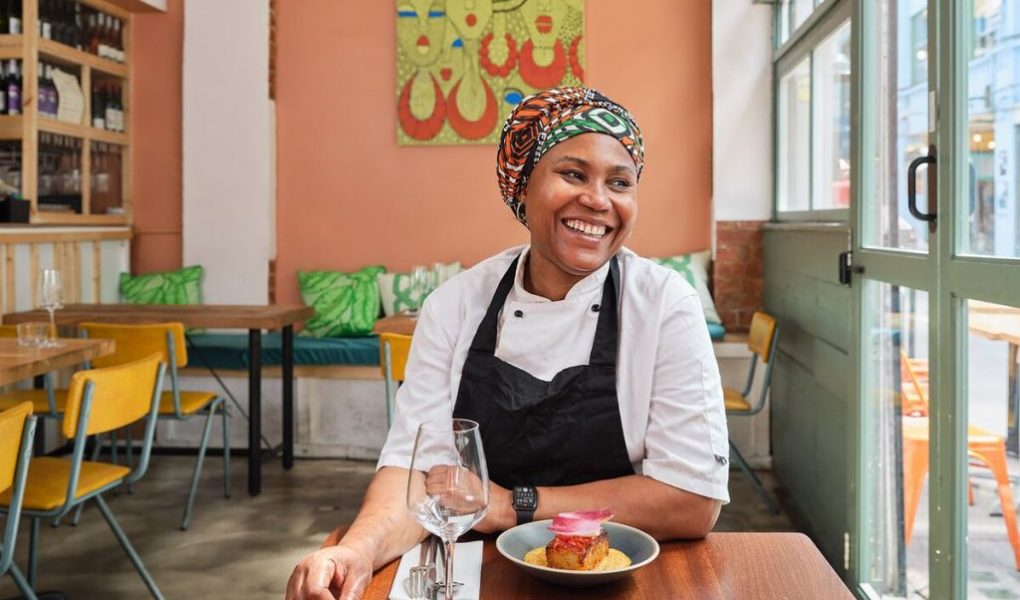
By Kwaku Gyasi | Bloomberg
Earning just one Michelin star has the potential to elevate just another dining spot to the highest ranks of culinary attention.
But even though Michelin Guides have been published for a century and have recently gone on an expansion tear, the number of current Michelin-starred restaurants run by Black chefs is still in the single digits.
The issue was thrust into the limelight after British actor Will Poulter, a star of the hit TV show The Bear, said in a July interview that food of African origin is “massively underrepresented at the fine dining level.”
Just six Michelin-starred restaurants around the world have Black executive chefs, according to Bloomberg analysis. (The chefs are Michael Caines, Charlie Mitchell, Marcel Ravin, Mory Sacko, Gerald Sombright and Georgiana Viou.) Poulter’s viral clip has amplified an ongoing question: Why are some food cultures overlooked by the standard bearers of restaurant guides—and who sets that standard?
Culinary Gold Medal
“It is the gold medal for most chefs to receive the Michelin star,” says Ayo Adeyemi, head chef at Akoko, a restaurant Poulter specifically called out as deserving a star. The tasting menu, which starts at £120 ($153), tracks a journey across West Africa, including jollof rice, the region’s signature dish; it is served in an artisanal pot, along with a little book detailing the history of the recipe.
RELATED: Michelin 2023 results: Which Bay Area restaurants won stars, which lost them?
The first Michelin Guide was published in 1900 and provided French motorists with such information as maps, gas stations and hotels. (The goal was to encourage road travel and drive demand for the company’s core product, tires.) In 1926, the guides began awarding a star to dining establishments; five years later, ratings expanded to the three-star system still in use. While stars are technically awarded to restaurants, the achievement is often attributed to their head chefs.
The judging process is secret. Anonymous reviewers visit eateries several times before awarding stars. Michelin maintains that the assessments are based on the following five criteria: quality of products; mastery of cooking technique; harmony and balance of flavors; voice and personality of chef as expressed in the cuisine; and consistency between visits and throughout the menu.
Today, more than 30 international locations have dedicated guides, mostly concentrated in Europe and East Asia, plus a growing number of cities in North America. In Brazil, Rio de Janeiro and São Paulo have a combined 13 restaurants with at least one star. None have a Black head chef—in the country with the highest population of people of African descent outside Africa itself. Michelin publishes no guides for the Caribbean and Africa.
Toxic Environments
Michelin has long faced criticism from those who see the dominance of Eurocentric and Japanese cuisines as signifying a narrow, exclusionary idea of fine dining. According to the group’s chief inspector in North America (responding anonymously because of his position), nearly 200 cuisine types are represented in the global selection—yet no restaurant whose menu focuses on West African foods has received a star. (In Paris, Mory Sacko’s single-starred MoSuke uses a good amount of West African ingredients, but the menu is international.)
The Michelin website lists more than 16,000 restaurants, including ones “recommended” by Michelin (i.e., places deemed notable but not worthy of a star). Just 13 are listed under the Africa category; only one, Piment in Hamburg, has a star, and its menu is focused on North African cuisine.
Adeyemi notes that African gastronomy was long perceived as unworthy of attention but has gained global recognition in recent years. ”When I was growing up in the industry as a young chef, restaurants like this weren’t around,” he says of Akoko. “So I was forced to have to learn the modern British culture, the modern Asian culture, the modern French culture.”
To be sure, the Bib Gourmand category, introduced by Michelin in 1997, recognizes food at a more reasonable price point and showcases a more diverse range of cuisines. But even with this expanded selection, Michelin still carries a strong association with fine dining, a term that remains charged with prestige and exclusivity. Some chefs say inspectors inherently link the concept to French gastronomy, and the stereotype that a prestige restaurant should serve dishes on a white tablecloth. Meanwhile, many chefs of color face continuing obstacles navigating the culinary industry.
James Cochran, for one, cut his teeth working in a string of Michelin-starred kitchens, including the Harwood Arms gastropub, until 2018, when he opened 12:51, his own restaurant in north London’s Islington. Cochran says running his own kitchen has allowed him to highlight his West Indian and Scottish heritage while offering refined cooking at relatively affordable prices.He had worked in hospitality since his teens in Whitstable, Kent, but after moving to London, Cochran found a dark side in the sector. While he was accustomed to being the only person of Black or mixed heritage at work—a pattern he has worked to break in his own kitchen—he wasn’t expecting to deal with high levels of racial abuse from colleagues.
“It was a pretty toxic environment,” he reflects. “I was not being treated with the respect I deserve.”
Financial Penalties
Black chefs face business challenges, too, according to Adejoké Bakare, head chef at Chishuru, a cult favorite dining spot she describes as West African food with a London accent. Many Black restaurateurs are told they aren’t “commercial enough,” she says, noting a long list of prerequisites that landlords put forth and investors present before they feel comfortable putting money into Black-led businesses.Even prior experience at distinguished restaurants guarantees nothing, says Asma Khan, the Indian-born British chef-owner of Darjeeling Express, who faced discrimination securing a space for her restaurant.
Chishuru was first opened by Adejoké Bakare in 2020 in Brixton, a historically Afro-Caribbean neighborhood in south London, and was named best restaurant of 2022 by London’s Time Out magazine. The set menu went for £48 ($61) and featured dishes such as tamarind-glazed fried tripe and her take on gbegiri, a West African soup with seared chicken and spicy bean and lentil puree. This fall, the Nigerian-born Bakare will reopen her restaurant in a central London location. She summarizes the hesitation she noted among landlords in the city center as, effectively: “We don’t think you are the look of people in this area.”
This stands in contrast to another skin color-focused kitchen story that recently garnered attention. British chef Thomas Straker went viral after posting a photo of his all-white, all-male team of cooks for the upcoming outpost of his eponymous restaurant. Straker responded to the backlash by asking commenters to “gather CVs of any chefs you think we’re missing from the team” before he issued an apology.
Part of the wider problem for Black chefs are the financial barriers to becoming one. “Representation at the upper levels of gastronomy starts with access to a culinary education, financial support, mentorship and mobility, which are challenges to aspiring chefs,” wrote the Michelin Guide’s chief inspector in North America in an email. To complete an associate’s degree at the Culinary Institute of America, one of the world’s foremost cooking schools, a student in New York would have to pay $35,520 for tuition alone.
Matters of exclusion extend to dining out. The average cost of a tasting menu at a three-star restaurant in the UK is £240, excluding wine—a price that’s out of reach for most people.
Do Stars Still Matter?
The rise of social media, which has allowed diners to democratize criticism and crown their own favorite dining spots, has challenged the importance of the Michelin Guide. Adeyemi notes that people can showcase their favorite restaurants without relying on an entrenched gatekeeper to validate their opinions.
“The Michelin star doesn’t mean what it used to,” Cochran says. “It’s kind of a dated accolade.”
Moreover, the company has come under fire for a perceived pay-to-play mentality in recent years, as some published guides focused on areas whose local tourism agencies funded the endeavor. In 2019, Visit California was reported to have paid Michelin $600,000 to expand coverage to the whole state. The Miami Herald reported that a 2021 deal with tourism boards in Orlando, Miami, Tampa and the state of Florida prompted creation of a guide covering the three cities that would generate $1.5 million in revenue for Michelin over three years.
Michelin could use its expansion to help tackle its lack of diversity. Later this year, it will publish an inaugural guide for Atlanta, presenting it with fresh opportunities to find Black dining spots that merit stars; the city’s population includes 48% Black residents, and traditional African American cooking is integral to Atlanta’s food scene.
Even with the obstacles, Adeyemi hopes more young Black people will note his own success to envision a career in hospitality as a viable path. Fretting that Black chefs are conditioned to view certain foods as inferior, Bakare insists that cooks of color maintain their sense of identity while persevering to prove the value of their work. “Rightly or wrongly, we put ourselves in that category without other people doing it for us,” she says.
Most important, the industry needs to recognize that the market for food from Black chefs from all over the world exists and is growing fast. Bakare is baffled by the perception that diners don’t want West African food. She heard over again from landlords in central London: “‘People in this area might not come to eat that food’,” to which Bakare responds: it’s something “which time and time again, we have debunked.”
More stories like this are available on bloomberg.com
©2023 Bloomberg L.P.
𝗖𝗿𝗲𝗱𝗶𝘁𝘀, 𝗖𝗼𝗽𝘆𝗿𝗶𝗴𝗵𝘁 & 𝗖𝗼𝘂𝗿𝘁𝗲𝘀𝘆: www.mercurynews.com
𝗙𝗼𝗿 𝗮𝗻𝘆 𝗰𝗼𝗺𝗽𝗹𝗮𝗶𝗻𝘁𝘀 𝗿𝗲𝗴𝗮𝗿𝗱𝗶𝗻𝗴 𝗗𝗠𝗖𝗔,
𝗣𝗹𝗲𝗮𝘀𝗲 𝘀𝗲𝗻𝗱 𝘂𝘀 𝗮𝗻 𝗲𝗺𝗮𝗶𝗹 𝗮𝘁 dmca@enspirers.com




